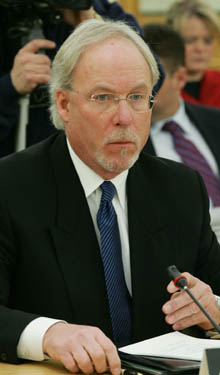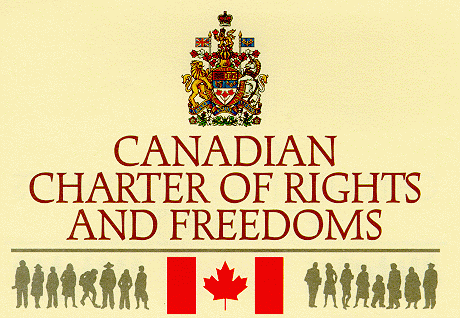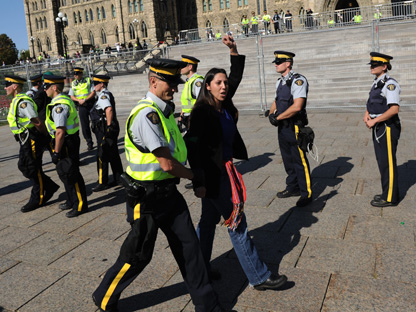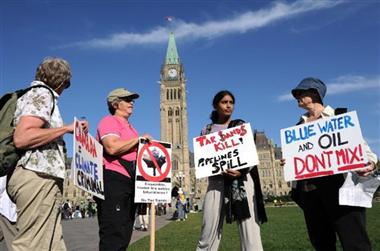This should be the first of a series of posts on these issues, which I hope will provide some critical context for the aggressive radicalism of the Harper government. In the meantime, above is Public Safety Minister, Vic Toews (whose tale will be told in further detail shortly) lying about what he said in parliament last week to opposition members taking a principled stand against Bill C-30, which is intended to provide police unwarranted access to the internet traffic of private citizens.
Category Archives: Canada
Legitimizing Canadian Torture

Former CSIS director and advocate for torture, Jim Judd. (Photo: Fred Chartrand, Canadian Press)
Just under fifty years ago our prime minister was Lester B. Pearson, onetime president of the United Nations General Assembly and recipient of the Nobel Peace Prize.
Now we have this:
Canada’s spy agency was so reliant on information obtained through torture that it suggested the whole security certificate regime, used to control suspected terrorists in the country, would fall apart if they couldn’t use it.
That’s the essence of a letter written in 2008 by the former director of CSIS, Jim Judd, obtained by The Gazette.
It suggests a disturbing acceptance by the national security agency of torture as a legitimate strategy to counter terrorism
Let’s make this very simple. Any Canadian citizen who practices or authorizes the use of torture should be charged, tried, and incarcerated in one of the new prisons the Harper government, despite our falling crime rate, has decided we need. The only obvious increase in criminality in Canada at the moment is at the top.
“Fundamental Freedoms”

Frye in “The Analogy of Democracy”: “Law is the expression of temporal authority; justice is law informed by freedom and equality.” (CW , 176)
The headline in yesterday’s Toronto Sun bellowed, “MAKE ‘EM PAY!”, referring to the Occupy Toronto demonstrators assembled on public land.
In case there is any doubt in anyone’s mind, here, in its entirely — all thirty-five unambiguous words of it — is section II of the Canadian Charter of Rights and Freedoms:
Everyone has the following fundamental freedoms:
-
(a) freedom of conscience and religion; (b) freedom of thought, belief, opinion and expression, including freedom of the press and other media of communication; (c) freedom of peaceful assembly; and (d) freedom of association.
Frye, of course, identifies freedom as one of four primary concerns in Words with Power.
Keystone XL White House Protest Sunday
Think Progess has a story here. Currently, 10,000 people have signed up to attend the protest at the White House this Sunday. A Q&A on the pipeline in the Guardian here.
The final decision is Obama’s alone, at this point. He can exercise an executive veto on the project. Rolling Stone reviews his recent remarks on the pipeline here. An excerpt:
“[The State Department] will be giving me a report over the next several months and, you know, my general attitude is, what is best for the American people? What’s best for our economy both short-term and long-term? But also, what’s best for the health of the American people?” Obama said in a Nebraska TV interview. “Because we don’t want for example aquifers . . . adversely affected. Folks in Nebraska obviously would be directly impacted, and so we want to make sure we’re taking the long view on these issues.”
Greenhouse gas emissions rose by 6% last year, the largest annual rise ever recorded. China’s carbon dioxide emissions now exceed the U.S. by 50%. Story here.
Previous posts on Keystone XL here, here, here, here, and here.
Frye quote here.
Video of the Day: “A different kind of oil sands”
httpv://www.youtube.com/watch?v=D1mZMOP-wbY
The rebranding of the tar sands continues, as the ad above illustrates — they’re different now; we’ll present them differently and that will make them different. It is a lie.
After the jump, some photos depicting the truth.
Video of the Day: Occupy Wall Street; Keystone XL [Updated]
Russian Television appears to be the only network actually producing journalism on this story on a daily basis, unlike the occasional update from major North American networks dismissing the protesters as hippies with no clear agenda. Here is their agenda, clearly posted on their web site:
1. Place fees on financial transactions and tax capital gains the same as income
2. End corporate personhood and overturn the flawed Citizens United decision
3. Get big money out of politics through substantive campaign finance reform
4. Jobs through investment in the public sector and infrastructure, not tax cuts for the wealthy and corporations
We couldn’t post any video of news reports on the Keystone XL protest in Ottawa because there is none. The CBC has not even posted a story in four days. So make that the non-existent video of the day.
Update: Meanwhile, the Occupy Wall Street protest has spread to San Francisco and Boston, where twenty-four have been arrested.
Demonstration in front of Bank of America, Boston
Update 2: U.S. News and World Report:
By accessing Canada’s crude oil the United State moves closer to its goal of reducing reliance on oil from the Middle East, a goal shared and expressed by every U.S. president since Dwight D. Eisenhower.
This is so ludicrous that it qualifies as a lie. The tar sands produce less than 800,000 barrels of oil per day. The total American consumption of oil is 20,000,000 barrels a day. That is more than a 19,000,000 barrel shortfall. Per day. And that’s just American needs. The world’s daily consumption is around 80,000,000 barrels.
Update 3: Bill McKibben has a story on the protests and the pipeline in Rolling Stone. An excerpt:
The Keystone XL pipeline wraps up every kind of environmental devastation in one 1,700-mile-long disaster. At its source, in the tar sands of Alberta, the mining of this oil-rich bitumen has already destroyed vast swaths of boreal forest and native land – think mountaintop removal, but without the mountain. The biggest machines on earth scrape away the woods and dig down to the oily sand beneath – so far they’ve only got three percent of the oil, but they’ve already moved more soil than the Great Wall of China, the Suez Canal, the Aswan Dam and the Pyramid of Cheops combined. The new pipeline – the biggest hose into this reservoir – will increase the rate of extraction, and it will carry that oily sand over some of the most sensitive land on the continent, including the Ogallala aquifer, source of freshwater for the plains. A much smaller precursor pipeline spilled 14 times in the past year.
Even if the oil manages to get safely to the refineries in Texas, it will take a series of local problems and turn them into a planetary one. Because those tar sands are the second-biggest pool of carbon on earth, after the oil fields of Saudi Arabia. Burning up Saudi Arabia is the biggest reason the Earth’s temperature has already risen one degree from pre-industrial levels, that epic flood and drought have become ubiquitous, and that the Arctic is melting away. Since we didn’t know about climate change when we started in on Saudi Arabia, you can’t really blame anyone. But if we do it a second time in Canada, we deserve what we get.
If you do the calculations, explains James Hansen – the planet’s most important climate scientist, who was arrested at the White House about halfway through the two weeks of protest – opening up the tar sands to heavy exploitation would mean “it’s essentially game over” for the climate. Which is a sentence worth reading twice. Right now, the atmosphere holds 392 parts per million CO2, already dangerously above the 350 ppm scientists say is the maximum safe level. If you could somehow burn all the tar sands at once, which thank heaven you can’t, the atmospheric concentration would rise another 150 parts per million.
TGIF: NFB, Cont’d
Yet another TGIF NFB historical vignette, and a pleasant example of what a cheeky popular culture can do very efficiently — in this case, in one minute and three seconds.
An earlier post on Frye on the NFB here.
Quote of the Day 2: Keystone XL

Martin Lukacs of the Guardian notes that the Ottawa protest may signal wider public protest:
The Canadian action heralds a new spirit of defiance in the broader climate change movement. It follows on two weeks of sit-ins at the White House in Washington last month where more than 1,200 people were arrested over Keystone XL – the TransCanada pipeline that would carry the dirty Alberta oil to Texas refineries. The Washington protesters successfully introduced millions of Americans to their No 1 source for oil imports, putting an ecological-disaster zone the size of Florida on the map; now, their Canadian counterparts showed they were neither silent nor passive on the issue. These are signs that the environmentalist community – professionalised and tame for too long – may have discovered a much-needed impetus for civil disobedience.
(Photo: Sean Kilpatrick, Canadian Press)
Keystone XL Protest in Ottawa

The CBC has coverage of the arrests at the Keystone XL protests in Ottawa here.
(Photo: The Canadian Press)
The Politics of Fear
http://www.youtube.com/watch?v=90rw7_6cUDE
The Conservatives’ Omnibus Crime Bill is working its way through the House. The tax-payer funded Government of Canada television ad above, one of many like it that ran in the weeks before the election was called, is now airing again. The intention clearly is to tenderize the public and put it in the mood for “reform.”
As is typically the case with the Conservatives, it’s about fear. They take a worst-case scenario and make it appear to be the widespread norm. This is a recognizable part of what seems to be a cynical and ongoing propaganda campaign. If anyone can find statistics regarding any significant incidence of middle-class children under the age of ten using “juicy” as depicted in this ad, I’d be grateful.
The Conservatives apparently want to change our attitude toward government on all fronts, and the message is clear: government can’t afford to provide the services we want and need, but it can “protect” us from bogies and bumps in the night. It can’t find the money for expanded health care, but there’s more than enough to build prisons.
Like conservatives in the U.S., Canada’s Conservative Party disdains government as a provider of public service, and has taken hold of the instruments of government in order to undermine it. It is obvious at this point that they do so on behalf of their real constituency, the rich and corporations, who are the only beneficiaries of government policy to any significant extent. The fact that income inequality in Canada is now increasing at a faster rate than the U.S. verifies as much.